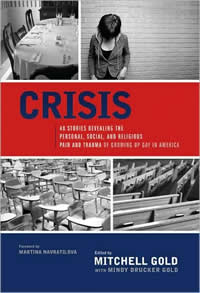Book Notes
 Mitchell Gold, editor, with Mindy Drucker, Crisis: 40 Stories Revealing the Personal, Social, and Religious Pain and Trauma of Growing Up Gay in America (Austin, TX: Greenleaf Book Group Press, 2008), 369pp.
Mitchell Gold, editor, with Mindy Drucker, Crisis: 40 Stories Revealing the Personal, Social, and Religious Pain and Trauma of Growing Up Gay in America (Austin, TX: Greenleaf Book Group Press, 2008), 369pp.
If you grow up gay, this book shows, you have two choices.
First, you can manufacture a false and increasingly neurotic self that must lie at all costs, to all people, all the time, merely to survive. You must compartmentalize your public and private lives, deny what you know to be true about yourself, and vigilantly censor yourself in everything you do, say, and feel. Living this way leads to mental, physical and emotional exhaustion, self-hatred, suicidal ideation, cutting, and chronic frustration. This first scenario begs the question, "how long can you deny who you really are?" As one contributor put it, "the closet is a terrible place to live."
But there's a second option. You can let down your guard and live spontaneously as your true and authentic self. But in this scenario you face catastrophic losses in your church, synagogue, family, job, school and community. For some gays, living authentically comes at an unacceptably high price. Among religious believers and before God, could you live with being called an abomination who ought to be stoned to death (Leviticus 20:13) and who will suffer forever in hell? Would you be willing to risk full and final rejection by your family? How well do you think you could endure daily taunts and physical abuse at school? Do you think you'd risk your career for the sake of authenticity? Nor is honoring your true self psychologically easy: "The only way I survived as a gay man," writes one person, "was by embracing everything I was taught to hate about myself."
I was deeply moved by these short (4-5 pages each), simple, and intensely personal stories. They're organized around four themes: religion, family-community, work and school. The authors come from a wide variety of backgrounds, from white evangelicals to black Baptists, devout Mormons, orthodox Jews, and conservative Catholics. There are young teenagers, famous politicians, and two professional athletes. Most of the stories (31 of 40) are written by men, and there's no story written by a transgendered person. The last two stories are written by mothers who describe how they lost their gay teenagers to suicide and a brutal murder.
With remarkable regularity and similarity, every story witnesses to "the power and tenacity of our social conditioning" which punishes gay people. They refute the discredited but prevalent ideas that people choose or can change their sexual orientation. In fact, almost every gay person in this book has done everything in their power to try to change—denial, aversion therapies, "reparative" therapy, behavior modification, overcompensation, electric shock treatments, prayers, counseling, and even exorcism. But if you flip the question you understand the futility of trying to alter what cannot change: did you choose to be heterosexual or could you change yourself to a gay orientation?
This tragic mental health crisis, writes Gold, is entirely preventable and solvable. His book does a tremendous service in taking readers down that long road to wholeness and healing.


